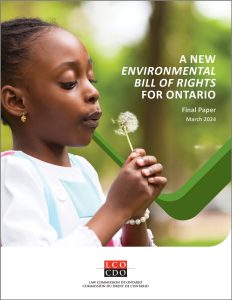Project Overview
The Law Commission of Ontario’s A New Environmental Bill of Rights for Ontario: Final Report examines Ontario’s Environmental Bill of Rights, 1993 (EBR).
The EBR transformed environmental decision–making in Ontario. The EBR established important mechanisms to improve public participation, transparency, and government accountability for environmental decision-making. The EBR‘s “political accountability” model was ground-breaking when it was adopted. The legal framework established by the EBR largely remains in place today.
The LCO project considers how well Ontario’s EBR is working; whether and how the EBR should be updated to reflect contemporary environmental priorities, issues, and accountability strategies; and how to amend the EBR to improve its procedures and clarify its application.
The LCO Report
The LCO’s A New Environmental Bill of Rights for Ontario: Final Report concludes an intensive two-year research and consultation process on environmental accountability issues in Canada and internationally.
The LCO and many other commentators and studies have concluded that the EBR is no longer effective. Changes in EBR policies and practices have effectively sheltered many significant provincial environmental decisions from important accountability requirements. Nor has the EBR been updated to account for contemporary environmental priorities, including the right to a healthy environment, environmental justice, the need to address climate change, and the need to promote Indigenous reconciliation. As a result, the EBR is failing to respond effectively to the environmental challenges which threaten the health and well-being of Ontario residents.
The LCO has concluded that major law reforms are needed to ensure environmental accountability in Ontario. The LCO report makes 58 recommendations to amend the EBR and related policies.
If enacted, these reforms would re-establish Ontario’s leadership on environmental accountability issues; promote stronger provincial environmental laws, policies, and decision-making; improve public accountability and participation; improve Ontario’s ability to address the impacts and harms of climate change; and improve environmental outcomes across the province.
The report is the first comprehensive, independent review of the EBR since it was enacted.
LCO Recommendations
The LCO’s 58 recommendations represent a comprehensive but necessary three-part law reform strategy that would:
Update the EBR to reflect contemporary environmental accountability principles and priorities by:
• Incorporating a right to a healthy environment into the EBR.
• Establishing a right for residents to commence environmental protection actions.
• Incorporating environmental justice principles and practices into the EBR.
• Updating the purposes of the EBR.
Update and clarify EBR procedures by:
The complete list of LCO recommendations is available in Appendix A of the Final Report and Executive Summary.
LCO Indigenous Environmental Accountability Project
The EBR was developed more than 30 years ago without Indigenous representation on its founding Task Force. Nor does the EBR require provincial environmental decision-makers to consider Indigenous issues or consult with Ontario’s Indigenous communities. This is a major gap that must be addressed in any contemporary assessment of environmental accountability in Ontario.
The Final Report does not consider Indigenous environmental issues in depth. Rather, the LCO has established a dedicated Indigenous Environmental Accountability Project to explore Indigenous rights, perspectives, and traditions as a possible source of environmental rights, as well as the disproportionate impact of environmental harm on Indigenous peoples in Ontario and elsewhere.
This project will begin in the spring of 2024. Project details will be posted on the LCO’s website.
Project Lead and Contacts
The LCO’s Project Lead is Nye Thomas. He can be contacted at athomas@lco-cdo.org.
The LCO can also be contacted at:
Email: LawCommission@lco-cdo.org
Web: www.lco-cdo.org
X (formerly Twitter): @LCO_CDO
LinkedIn: Law Commission of Ontario | Commission du droit de l’Ontario
Tel: (416) 650-8406
Toll-free: 1 (866) 950-8406
Law Commission of Ontario
2032 Ignat Kaneff Building
Osgoode Hall Law School, York University
4700 Keele Street Toronto, Ontario, Canada M3J 1P3
Project Documents
• Appendix A: List of Recommendations (2024, PDF)

